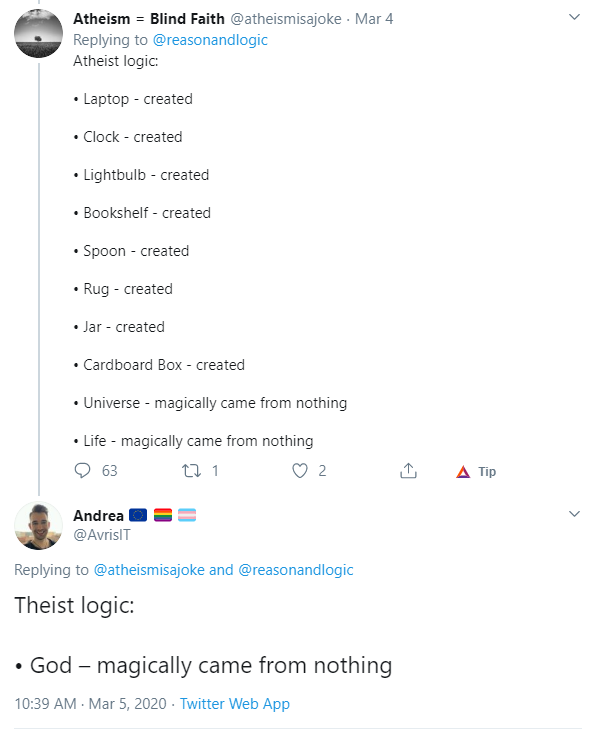I keep hearing this one argument over and over again: “if I see things around me that have been created, that means everything had to be created, that means there is a god”.
What they don't seem to notice (apart from such extrapolation being unjustified) is that looking in that direction actually points us towards there being no god.
First of all, it's like thinking “all the food I know comes from a supermarket, ergo that's where all food comes from”. That doesn't mean you're right. It just means you've never been to a farmer's market, to a greengrocer's, or seen someone produce their own food – and it means you're terrible at inductive logic.
Just because you're able to list eight objects manufactured by inteligent beings, doesn't necessarily mean every single thing in existence was necessarily manufactured by inteligent beings. That's just not how logic works.
Also: what you're addressing is not atheism. Atheism simply means looking at a claim “there is a god/gods” and saying “nah, I don't believe that”. That's all. Atheism doesn't require you to have any beliefs about the origins of the universe or life (or specifically a belief that “they came from nothing”). I'm pretty sure that Epicurus didn't have the faintest idea about the Big Bang theory or the modern understanding abiogenesis. He didn't think the universe came from nothing, he taught that it was eternal. It doesn't make him a theist, does it?
Then, there's the fact that neither the origins of the universe, nor the origins of life are currently understood by science as “coming from nothing”. Life came from matter (not nothing) that in proper conditions and by random chance over a very long time got organised in a way that let it reproduce, eventually leading to its complexity rising through natural selection. And the Big Bang means that the universe rapidly expanded from a singularity – we don't know exactly what the singularity was, but it doesn't necessarily mean it was “nothing”.
But... let's get to the main point: arguing that everything has to have a creator kinda undermines your own conclusion that there has to be a god who does not have a creator, doesn't it?
What purpose does your reasoning serve, other than just introducing a new step, an extra complexity? Inventing a god to solve the problem of not knowing where did all the stuff come from doesn't solve the problem, it just pushes it back a step. If the complexity of the universe (allegedly) can't be explained without an even more complex being, then it's gonna be even harder to explain that more complex being, won't it?
If you're asked “how do you explain X?” and you reply with “well, imagine there is a Y that doesn't need to be explained”, you're not really helping, are you?
And why exactly doesn't god need to be explained? I've only ever heard one answer to it: “because he's eternal”. Yeah, you can imagine he's eternal, so what?
And what if the universe is also eternal? What if it just keeps collapsing and exploding endlessly? Asking about things “before” the Big Bang make no sense, because the Big Bang created time, which pretty much makes the universe “eternal”. Are you satisfied with explaining the universe with “it just exists”, or does that only work with god?
If we want to use sound logic, let's apply the same principles to a potential god as we do to everything else, shall we? If everything has to have a creator, why doesn't god? If god can be eternal, why can't the universe? Do we need god to explain anything or can we go with the simpler answers?
 Avris
Avris
 Avris
Avris

